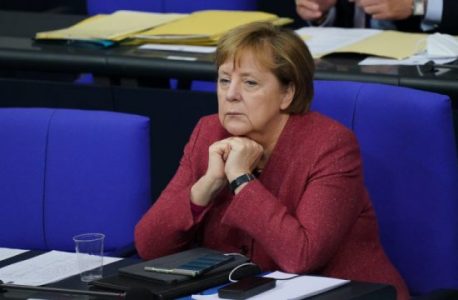By Sabine Beppler-Spahl for Spiked!
On the surface, 2020 seemed like a unique year in Germany (as in much of the world). A dangerous novel virus arrived and a new political experiment – the lockdown – was born. But the German government’s gloomy miserablism and politics of fear were sadly nothing new.
In theory, 2020 should have been a successful year for Germany’s governing elites, despite the great challenges posed by the pandemic. Back in August, polls showed record-breaking approval ratings for chancellor Angela Merkel and her coalition government.
At first, it even seemed as if the fight against the virus had granted the government and its supporters some respite in their ongoing battle with the populists. The Alternative for Germany (AfD) has found it difficult to develop a coherent response to Covid and has been mired in infighting. Populism was on the back foot, many seemed to think.
Though deaths from the virus, tragically, began to rise rapidly in autumn (at the time of writing over 21,000 Germans have died), around the same time we received the brilliant news of a vaccine. BioNTech, which developed one of the first successful vaccines, is based in Mainz. The quick development of this highly effective mRNA technique might have been seen as an expression of Germany’s innovative power and ingenuity. But that’s not how the German government liked to present the news. In the absence of any clear strategy for dealing with the virus, it has instead been keen to uphold a climate of fear and passivity.
Of course, neither Merkel – the ‘crisis chancellor’, or Krisenkanzlerin, as she is known in Germany – nor her government have ever been particularly inspiring. But her emotional, almost teary warnings of ‘a last Christmas with the grandparents’, just before announcing a new hard lockdown, marked a new low.
Merkel was not the only doom-monger this year, however. The German media insisted that there was ‘no reason for euphoria’ at the arrival of the vaccine. Few journalists made any demands of the EU authorities to approve its use, despite the UK, the US and Canada declaring it safe.
Another absurd example of this culture of fear was the media attention given to virologist Christian Drosten – a staunch lockdown supporter and one of the government’s top medical advisers. In November, he warned that a new, potentially even more deadly pandemic from the MERS virus could be around the corner.
Though Covid was certainly a challenge, the pandemic has largely just made many of our government’s underlying problems more visible. At a recent press conference, Markus Söder, the Bavarian state premier (often tipped as a successor to Merkel in the CDU), spoke of a society in a state of ‘semi-consciousness’. He was referring to the ‘lockdown lite’ Germany was living under until a full lockdown was introduced in December. But he could have just as easily been talking about what has happened to his party.
Although there will be federal elections next year, voters still don’t know who the CDU will nominate to replace Merkel as chancellor. And because there hasn’t even been a party conference this year, the hapless Annegret Kramp-Karrenbauer (AKK), who was meant to step down in February, is still the CDU’s acting chair. This sad state of affairs has nothing to do with Covid, but rather speaks to the party’s inability to handle its inner power struggles and deal with its long-term decay.
It will not have escaped the notice of the German voters, who are much more awake than Söder and Co would like them to be, that the AfD was perfectly capable of holding a party conference – live, with masks and social distancing.
For the government, 2020 will be the year of missed opportunities. It failed to take advantage of the public’s initial confidence in facing the new threat. It ignored people’s willingness to help their communities, which could have strengthened our social bonds in these testing times. It failed to develop a unifying strategy against the virus. Public debates about how the most vulnerable could be protected were avoided. In fact, it took months before parliament took any involvement in the virus strategy at all. Even positive actions, such as those of the city of Tübingen – where the mayor had some success in shielding the elderly and care homes from the worst of the pandemic – were largely ignored.
But not everyone was half-asleep. On top of the AfD – which has been at the core of two major internal CDU conflicts, first in Thuringia in February and then in Saxony Anhalt in December – a new opposition has emerged. The ‘Querdenker’ (German for ‘lateral thinkers’) have brought many thousands on to the streets in protest against the lockdowns. Despite its initial high approval ratings, the government has had a rude awakening.
Yes, 2020 has been a unique year, but not much has changed for Germany’s ruling elite. The government has now, in its deep defensiveness, banned anti-lockdown protests and is even having the Querdenker monitored by the secret service. Similarly, the courts have never before been so involved in politics.
The idea that politics would stand still because of a virus was always an illusion. Things are moving fast in Germany. And given the many unresolved tensions, the federal elections in 2021 could be full of surprises.
Source: Spiked

